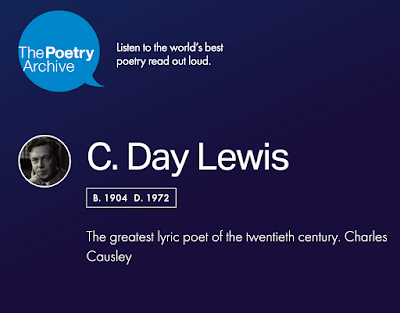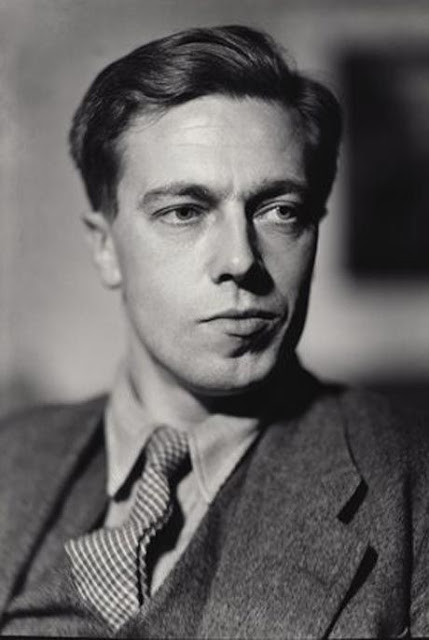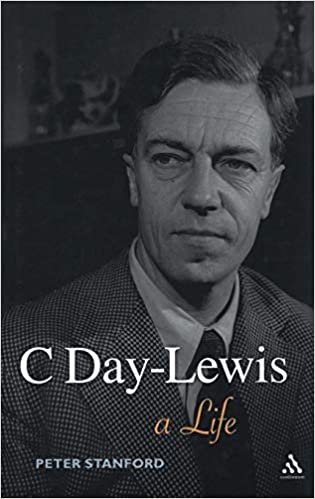The first person I thought of when I came up with this overall topic of writers languishing (or flourishing - who knows?) under Auden's shadow, was Rex Warner.
When I was a teenager I bought a second-hand copy of Warner's novel The Aerodrome (1941), and was suprised to observe that it came from a 'uniform edition' of his works.
Some of the comments on the blurb were intriguing, too. He was, it seems (according to V. S. Pritchett), 'the only outstanding novelist of ideas whom the decade of ideas has produced' and the comments about his other books made it clear that they, too, had been considered of major significance at the time.
The only Rex Warner I knew about was a translator and occasional commentator on Greek texts and culture. I had a copy of his version of Caesar's commentaries - conveniently, if unconventionally, transposed from the third person into the first. I also had his Penguin Classics translation of Thucydides.
Who, then, was this earlier Rex Warner, this eloquent critic of fascism, this author of a series of odd, symbolic texts which seemed to have run in parallel with much of the early work of Auden and his friends - The Wild Goose Chase (1937) with Auden & Isherwood's bizarre charade-play The Dog Beneath the Skin:
The Professor (1938) with Spender's play Trial of a Judge:
Why Was I Killed? (1943) with MacNeice's Group Theatre extravaganza Out of the Picture?
Rex Warner began, as novelists so often do, as a poet rather than a prose-writer. Remember those lines from C. Day Lewis's The Magnetic Mountain (1933) I quoted above, in the first of these posts?
Then I'll hit the trail for that promising land;
May catch up with Wystan and Rex my friend ...
It wasn't till four years afterwards that he finally broke into print with his own verse. Here are a couple of samples:
SonnetNote the prevalence of alliteration - a device brought back into popularity by Auden's predilection for Anglo-Saxon verse: "Doom is dark and deeper than any sea-dingle. / Upon what man it fall. ..."
How sweet only to delight lambs and laugh by streams,
innocent in love wakening to the early thrush,
to be wed by mountains, and feel the stars friendly,
to be a farmer's boy, to be far from battle.
But me my blood binds to remember men
more than the birds, not to be delicate with squirrels,
or gloat among the poppies in a mass of corn,
or follow in a maze endless unwinding of water.
Nor will my mind permit me to linger in the love,
the motherkindness of country among ascending trees,
knowing that love must be liberated by bleeding,
fearing for my fellows, for the murder of man.
How should I live then but as a kind of fungus,
or else as one in strict training for desperate war?
Note, too, the clipped, slightly awkward diction: another sign of the deep influence of his younger contemporary on his writing. The poem might as well have been titled 'Audenesque'. Sonnets composed in simple, prosaic language, too, were another favourite device of Auden's.
Having said that, the poem is not without interest in the severe psychological traumas it tries to explore. Who, in 1937, did not feel themselves 'in strict training for desperate war'?
Light and AirThe Auden influence is strong on this one, too. But here one might almost see Warner's preoccupation with the 'curious smell outside the window' as prophetic of Auden's later lines, in 'September 1, 1939':
Our private vision is death, and the seers are yellow
who saw something remarkable in the dark,
who left the gas turned on, but never lit it,
and innocently withdrew before the explosion,
only too glad to forgive everyone.
Broken fragments are left, pieces of pottery,
fragments of a branch or frond for the microscope,
groups seen for an instant in indistinct light,
sometimes a curious smell outside the window.
We sometimes raise our heads from the window sill.
We sometimes venture to the ruinous door;
in the creaking house we demand light and air;
for what we need most is an atmosphere
fit to be breathed, and light by which to see.
The unmentionable odour of death
Offends the September night
That same year, 1937, saw the publication of Warner's first novel, a rather bizarre allegorical mishmash called The Wild Goose Chase.
Clearly, judging by the blurb above, his publishers had high hopes of the book, and while it hasn't really stood the test of time as much as some of his later work, the same could easily be said of similarly mad creations of the thirties mindset as Auden's The Orators (1932) - or, for that matter, C. S. Lewis's allegorical novel The Pilgrim's Regress (1933):

C. S. Lewis: The Pilgrim's Regress: An Allegorical Apology for Christianity, Reason and Romanticism (1933)
Here's the verse dedication Warner wrote for the book:
Wild Goose, I made you a symbol of our Saviour,This makes clear the basically Christian perspective he was working from at the time, as well as his continuing devotion to Auden's stylistic tropes: that mention of 'motor-cyclists', for instance, surely recalls Auden's 1930 poem 'Consider This'?
With your fierce indifference to bye-laws and quiet flying,
your unearthly song, your neck like thunder and lightning,
and your mysterious barbaric love.
O missionaries and motor-cyclists!
Let us at daybreak honour the flying host,
the yelping hounds of air who, with blood for essence,
thrust like live shells through the speedways of heaven
above low coasts, over bed of rotting weed.
By light-houses, through showers of ice, listen
suddenly for onrush of wings, or from the storm
the bell-like note of an outriding voice.
Consider this and in our timeThere's more there than just Auden, though. For the first time, I think, we catch a distinct echo of Gerard Manley Hopkins.
As the hawk sees it or the helmeted airman
It's important to remember, in this connection, that - while we (rightly) consider Hopkins as a nineteenth-century poet, his collected verse was only published by his friend Robert Bridges in 1918, after the First World War.
Bridges, Robert, ed. Poems of Gerard Manley Hopkins. 1918. Second Edition With an Appendix of Additional Notes, and a Critical Introduction by Charles Williams. 1930. The Oxford Bookshelf. 1937. London: Oxford University Press, 1941.Charles Williams' second, enlarged edition appeared in 1930, just in time to exert a decisive influence on all of the thirties poets - especially Rex Warner's close friend, Cecil Day Lewis:
All of which brings us, by a a commodius vicus of recirculation back to The Aerodrome, his third and still most celebrated novel. Like Auden's The Orators, which it resembles in many ways, it's an allegorical / satirical account of Fascism - what a distinctly English brand of it might look like, and the aspects of English life which already tend in that direction:
Anthony Burgess, in the blurb I've reproduced above, describes it as 'the best, perhaps the only, English Kafka novel.' In his own introduction to a later reprint, he goes further and claims that: 'its value as literature becomes increasingly apparent at each rereading:
Maybe you had to be there. For me, it reads more like various other 'symbolic' works of the late thirties and early forties - Ernst Jünger's Auf den Marmorklippen [On the Marble Cliffs], for instance:
Or, for that matter, Alfred Kubin's pre-First World War account of a weird journey to the depths of the unconscious mind, Die andere Seite [The Other Side]:
I don't myself see much of Kafka there. Rex Warner's inspiration seems far more matter-of-fact than that to me, though perhaps the posthumour Amerika comes as close as anything.
For me, I'm afraid, the really readable and durable part of Warner's oeuvre comes in his later historical novels about such figures as St. Augustine, Julius Caesar and Pericles the Athenian. Each of these seems lively and interesting to me in a very original way - far beyond any conventional 'novelisation' of their respective careers.
I'd go so far as to say, in fact, that his only real rival in this field is the great Mary Renault, re-inventor of Ancient Greece for the love generation.
It's true that Renault's own homosexuality adds a passionate polemic dimension to these alleged 'recreations' of Ancient Greek mores - and incidentally guarantees the continuing value of her work - but Rex Warner runs her a close second in his vivid sense of what it might have been to be alive then.
Nor is his own work bereft of passion. Take, for example, this piece from his 1945 collection Poems and Contradictions:
Whether love leaping to love as loose as fishes,One thing seems certain. While his novels and stories may never be the first thing to leap to mind when you think of the thirties writers - or, for that matter, when you think of post-war classicists - anyone willing to give him the benefit of the doubt and actually pick up one of his excellent books will not find it disappointing.
sand-sensitive, hot and delicate as a moth,
or whether with crushing load and slavering mouth
on impassive flesh, and hate trembling the lashes,
or whether as customary, and without fuss
that seed slid in the membrane and found a home
in the throbbing darkness of the impulsive womb,
that seed lodged firm and mastered all the mass;
and knew no love but to take toll of blood,
dreaming the dream of creepers or of fish,
limpet or saurian, the start of man,
fastened and fettered by a string to food,
by love or lust or duty framed in flesh,
growing in bulk, and groping into pain.
Here is one case where a revival is, I firmly believe, long overdue. I haven't read the biography yet, by his student Stephen Tabachnick, but it seems to have been quite well reviewed.
[titles I own are marked in bold]:
-
Poetry:
- Poems. London: Boriswood Limited, 1937.
- Poems and Contradictions (1945)
- New Poems 1954 (with Laurie Lee and Christopher Hassall) (1954)
- The Wild Goose Chase: A Novel. London: Boriswood Limited, 1937.
- The Professor: A Novel. 1938. Penguin Books 482. Harmondsworth: Penguin, 1945.
- The Aerodrome. 1941. Uniform Edition. London: John Lane / The Bodley Head Ltd., 1946.
- Why Was I Killed? A Dramatic Dialogue. London: John Lane / The Bodley Head Ltd., 1943.
- Men of Stones: A Melodrama (1949)
- Escapade (1953)
- Julius Caesar: A One-Volume Edition of the Two Novels The Young Caesar and Imperial Caesar. 1958 & 1960. London: Collins Clear-Type Press, 1967.
- Pericles the Athenian. London: Collins Clear-Type Press, 1963.
- The Converts: A Novel of Early Christianity. London: The Bodley Head Ltd., 1967.
- Xenophon. The Persian Expedition. 1949. Penguin Classics. Harmondsworth: Penguin, 1952.
- Thucydides. History of the Peloponnesian War. 1954. Ed. M. I. Finley. 1972. Penguin Classics. Harmondsworth: Penguin, 1975.
- Plutarch. Fall of the Roman Republic. 1958. Ed. Robin Seager. 1972. Penguin Classics. Harmondsworth: Penguin, 1983.
- Caesar. War Commentaries. Mentor Books. New York: New American Library, 1960.
- Seferis, George. On the Greek Style: Selected Essays in Poetry and Hellenism. Trans. with Th. D. Frangopoulos. London: The Bodley Head Ltd., 1966.
- Xenophon. A History of My Times (Hellenica). 1966. Ed. George Cawkwell. Penguin Classics. Harmondsworth: Penguin, 1978.
- Plutarch. Moral Essays. Ed. P. A. Russell. Penguin Classics. Harmondsworth: Penguin, 1971.
- Men and Gods. 1950. Penguin Books 885. Harmondsworth: Penguin, 1952.
- Greeks and Trojans. 1951. Penguin Books 942. Harmondsworth: Penguin, 1953.
- Cavafy, C. P. Poems. Trans. John Mavrogordato. Introduction by Rex Warner. 1951. London: Chatto & Windus, 1974.
- The Stories of the Greeks: Men and Gods / Greeks and Trojans / The Vengeance of the Gods. 1951, 1953, 1955. New York: Farrar, Straus and Giroux, Inc., 1967.
- The Greek Philosophers. 1958. A Mentor Book. New York: New American Library, 1963.
- Stephen Ely Tabachnick: Fiercer Than Tigers: The Life and Work of Rex Warner. East Lansing: Michigan State University Press, 2002.
Fiction:
Translations:
Miscellaneous:
Secondary:































































